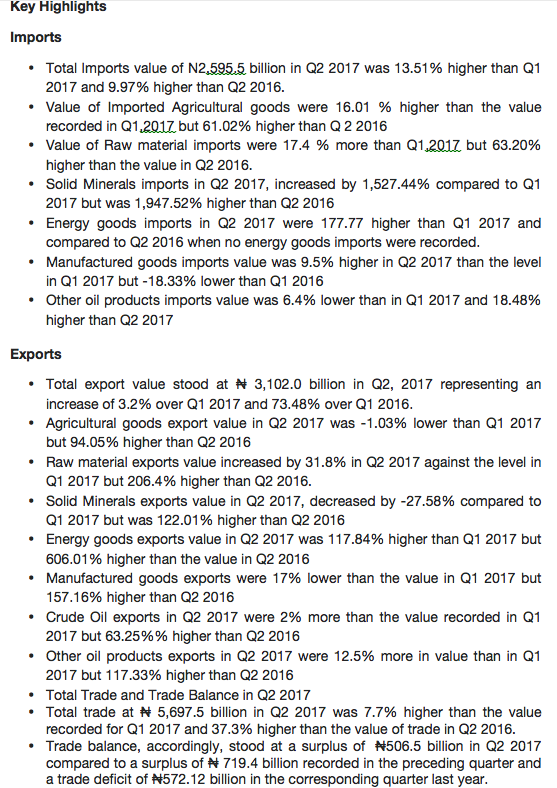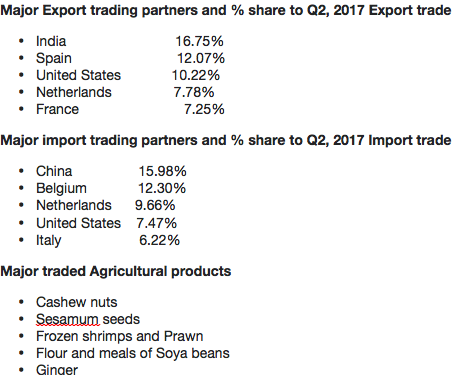Nigeria recorded a positive trade balance in the second quarter of 2017 despite the value of exports falling 29.6 percent when compared to the preceding quarter, according to trade figures released by the nation’s statistical agency, the National Bureau of Statistics, Wednesday.
The total value of Nigeria’s merchandise trade at the end of Q2, 2017 was put at ₦5.698 trillion, which indicates a slight increase of 7.7 percent from the ₦5.292 trillion recorded in the preceding quarter.
Total export for the period under review stood at ₦3.102 trillion (54 percent total merchandise trade), while total import stood at ₦2.595 trillion (45.6 percent). While imports in the review period showed an increase of 13.5 percent more than the value recorded in the preceding quarter, exports grew at 3.2 percent when compared to the previous quarter.
The marginal rise in exports, as well as increased imports, brought the country’s trade balance in Q2, 2017 to ₦506.5 billion from ₦719.4 billion recorded in the preceding quarter.
This trade surplus of N506.5 billion recorded during the period under review was therefore 29.6 percent lower than the figure recorded in Q1, 2017.
According to figures gleaned from the NBS report, the structure of export trade showed that domestic exports accounted for N3.066 trillion or 98.8 percent of total exports, while re-export accounted for N35.8 billion or 1.2 percent of total export during the period under review.
A further review of total trade by product/sector in Q2 2017 showed that crude oil trade of N2.42 trillion accounted for 42.57 percent of total trade during the period under review. This was followed by the other oil sector category of N1.24 trillion, which accounted for 21.9 percent of total trade.
During the same period, manufactured goods trade of N1.24 trillion accounted for 21.86 percent, while raw materials goods trade of N0.32 trillion accounted for 5.63 percent of total trade.
Agricultural goods trade of N0.26 trillion accounted for 4.60 percent of total trade while solid mineral goods trade of N0.19 trillion accounted for 3.42 percent of total trade with trade in energy goods of N1.55 billion accounting for 0.03 percent of total trade in the referenced period.

Exports by section revealed that Nigeria exported mainly mineral products, which accounted for ₦2.968 trillion or 95.7 percent of the total export value. Other products exported by Nigeria includes vehicles, aircraft and parts thereof; vessels etc. at ₦36.0 billion or 1.2 percent; prepared foodstuffs, including beverages spirits and vinegar, tobacco at ₦29.7billion or 1.0 percent.
Examining export by direction, showed that the country exported goods mainly to India, Spain, the United States, Netherlands, and France, whose values stood at ₦519.7 billion or 16.8 percent, ₦374.4 billion or 12.1 percent, ₦317.1 billion or 10.2 percent, ₦241.3 billion or 7.8 percent, and ₦224.9 billion or 7.2 percent respectively.
The five countries thus account for 54.1 percent of total exports in Q2 2017, while exports to all other countries of the world in the period under review amounted to ₦1.424.6 trillion or 45.9 percent.
On the other hand, Nigeria’s import trade stood at ₦2.595 trillion at the end of Q2, 2017, showing an increase of 13.5 percent from the ₦2.287 trillion recorded in the preceding quarter.
The structure of Nigeria’s import trade by section was dominated by the imports of “mineral products” which accounted for 34.7 percent of the total value of import trade in the period.
Other commodities which contributed noticeably to the value of import trade during the review period were boilers, machinery and appliances (15.8%); products of the chemical and allied industries (9.1%); prepared foodstuffs, including beverages, spirits and vinegar; tobacco (8.0%) and vegetable products (6.0%).
The import trade classified by broad economic category revealed that industrial supplies ranked first with ₦785.6 billion or 30.3 percent, followed by fuels and lubricants with the value of ₦694.6 billion or 26.8 percent, and food and beverage with ₦ 443.8 billion or 17.1 percent. The value of motor spirit imports stood at ₦556.1 billion.
Nigeria’s import trade by direction showed that the country imported goods mostly from China, Belgium, Netherlands, the United States and Italy, which respectively accounted for ₦414.7 billion or 16.0 percent, ₦319.2 billion or 12.3 percent, ₦250.8 billion or 9.7 percent, ₦ 193.8 billion or 7.5 percent, and ₦ 161.5 billion or 6.2 percent.
The five countries accounted for 51.6 percent of total imports, while all other countries of the world accounted for ₦1,255.4 billion or 48.4 percent of the total value of goods imported during the quarter.








